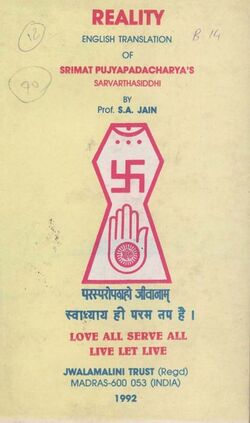Religion:Sarvārthasiddhi
| Sarvārthasiddhi | |
|---|---|
 English translation of the Sarvārthasiddhi | |
| Information | |
| Religion | Jainism |
| Author | Pujyapada |
| Language | Sanskrit |
| Period | 464 - 524 CE |
Sarvārthasiddhi is a famous Jain text authored by Ācārya Pujyapada. It is the oldest extant commentary on Ācārya Umaswami's Tattvārthasūtra (another famous Jain text).[1][2] Traditionally though, the oldest commentary on the Tattvārthasūtra is the Gandhahastimahābhāṣya.[3] A commentary is a word-by-word or line-by-line explication of a text.
Author
Ācārya Pujyapada, the author of Sarvārthasiddhi was a famous Digambara monk. Pujyapada was a poet, grammarian, philosopher and a profound scholar of Ayurveda.[4]
Content
The author begins with an explanation of the invocation of the Tattvārthasūtra. The ten chapters of Sarvārthasiddhi are:[5]
- Faith and Knowledge
- The Category of the Living
- The Lower World and the Middle World
- The Celestial Beings
- The Category of the Non-Living
- Influx of Karma
- The Five Vows
- Bondage of Karma
- Stoppage and Shedding of Karma
- Liberation
In the text, Dāna (charity) is defined as the act of giving one's wealth to another for mutual benefit.[6]
English translation
Prof. S. A. Jain translated the Sarvārthasiddhi in English language. In the preface to his book, he wrote:
Shri Pujyapada’s Sarvārthasiddhi has exercised a great fascination on my mind ever since I commenced the study of this great work. Very few works of the world’s literature have inspired me to the same extent or have provided equally satisfactory answers to the world’s riddles, which have perplexed the greatest thinkers of all ages. No philosophical work that I know of treats of the great issues that confront humanity with the same simplicity, charm, ease and freedom.[7]
References
Citations
- ↑ Jain 2014, p. xiv.
- ↑ Banerjee, Satya Ranjan (2005). Prolegomena to Prakritica et Jainica. p. 151. https://books.google.com/books?id=cnxjAAAAMAAJ.
- ↑ Vijay K. Jain (2018). Tattvartha Sutra. https://www.wisdomlib.org/jainism/book/tattvartha-sutra-with-commentary/d/doc1084570.html.
- ↑ Indian Journal of the History of Medicine. 1956. p. 25. https://books.google.com/books?id=Z_AiAQAAMAAJ.
- ↑ S.A. Jain 1992, p. vi-vii.
- ↑ Ram Bhushan Prasad Singh 2008, p. 84.
- ↑ S.A. Jain 1992, p. v.
Sources
- Jain, S.A. (1992), Reality, Jwalamalini Trust, https://books.google.com/books?id=uRIaAAAAMAAJ, "
 This article incorporates text from this source, which is in the public domain." Alt URL
This article incorporates text from this source, which is in the public domain." Alt URL - Jain, Vijay K (2014-03-26), Acarya Pujyapada's Istopadesa – the Golden Discourse, Vikalp Printers, ISBN 9788190363969, https://books.google.com/books?id=r5opAwAAQBAJ
- Singh, Ram Bhushan Prasad (2008), Jainism in Early Medieval Karnataka, Motilal Banarsidass, ISBN 978-81-208-3323-4, https://books.google.com/books?id=JtWGm4E4qZIC
External links
- Tattvartha Sutra with Sarvarthasiddhi English translation by Vijay K. Jain, 2018 (includes glossary)
 |

